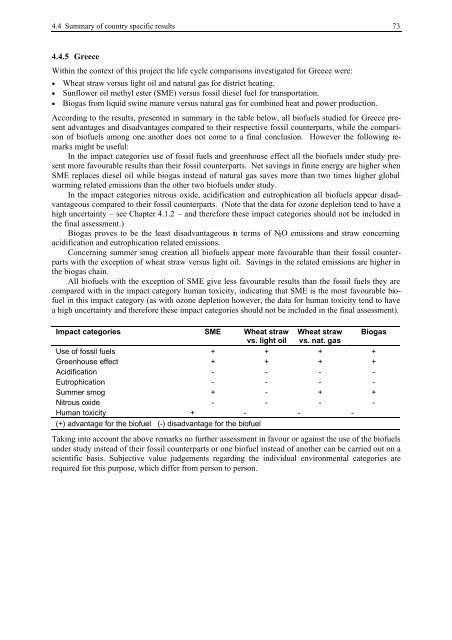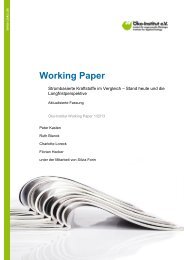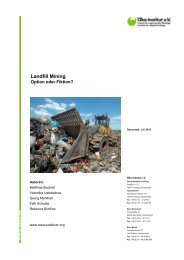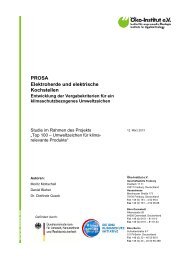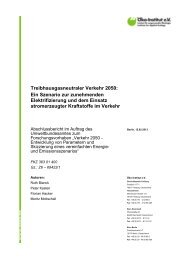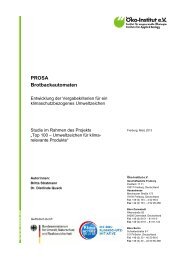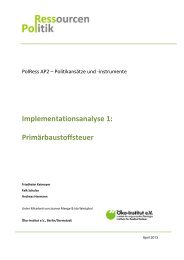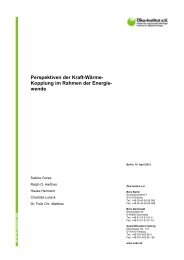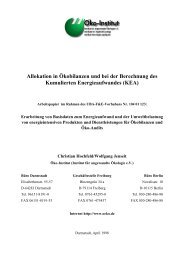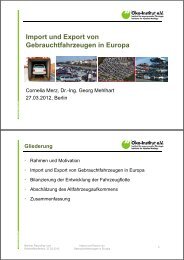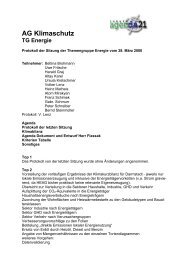BIOENERGY FOR EUROPE: WHICH ONES FIT BEST?
BIOENERGY FOR EUROPE: WHICH ONES FIT BEST?
BIOENERGY FOR EUROPE: WHICH ONES FIT BEST?
Create successful ePaper yourself
Turn your PDF publications into a flip-book with our unique Google optimized e-Paper software.
4.4 Summary of country specific results 73<br />
4.4.5 Greece<br />
Within the context of this project the life cycle comparisons investigated for Greece were:<br />
• Wheat straw versus light oil and natural gas for district heating.<br />
• Sunflower oil methyl ester (SME) versus fossil diesel fuel for transportation.<br />
• Biogas from liquid swine manure versus natural gas for combined heat and power production.<br />
According to the results, presented in summary in the table below, all biofuels studied for Greece present<br />
advantages and disadvantages compared to their respective fossil counterparts, while the comparison<br />
of biofuels among one another does not come to a final conclusion. However the following remarks<br />
might be useful:<br />
In the impact categories use of fossil fuels and greenhouse effect all the biofuels under study present<br />
more favourable results than their fossil counterparts. Net savings in finite energy are higher when<br />
SME replaces diesel oil while biogas instead of natural gas saves more than two times higher global<br />
warming related emissions than the other two biofuels under study.<br />
In the impact categories nitrous oxide, acidification and eutrophication all biofuels appear disadvantageous<br />
compared to their fossil counterparts. (Note that the data for ozone depletion tend to have a<br />
high uncertainty – see Chapter 4.1.2 – and therefore these impact categories should not be included in<br />
the final assessment.)<br />
Biogas proves to be the least disadvantageous in terms of N2O emissions and straw concerning<br />
acidification and eutrophication related emissions.<br />
Concerning summer smog creation all biofuels appear more favourable than their fossil counterparts<br />
with the exception of wheat straw versus light oil. Savings in the related emissions are higher in<br />
the biogas chain.<br />
All biofuels with the exception of SME give less favourable results than the fossil fuels they are<br />
compared with in the impact category human toxicity, indicating that SME is the most favourable biofuel<br />
in this impact category (as with ozone depletion however, the data for human toxicity tend to have<br />
a high uncertainty and therefore these impact categories should not be included in the final assessment).<br />
Impact categories SME Wheat straw<br />
vs. light oil<br />
Wheat straw<br />
vs. nat. gas<br />
Biogas<br />
Use of fossil fuels + + + +<br />
Greenhouse effect + + + +<br />
Acidification - - - -<br />
Eutrophication - - - -<br />
Summer smog + - + +<br />
Nitrous oxide - - - -<br />
Human toxicity + - - -<br />
(+) advantage for the biofuel (-) disadvantage for the biofuel<br />
Taking into account the above remarks no further assessment in favour or against the use of the biofuels<br />
under study instead of their fossil counterparts or one biofuel instead of another can be carried out on a<br />
scientific basis. Subjective value judgements regarding the individual environmental categories are<br />
required for this purpose, which differ from person to person.


